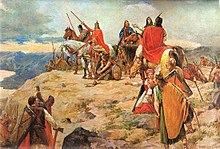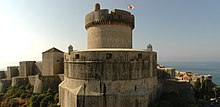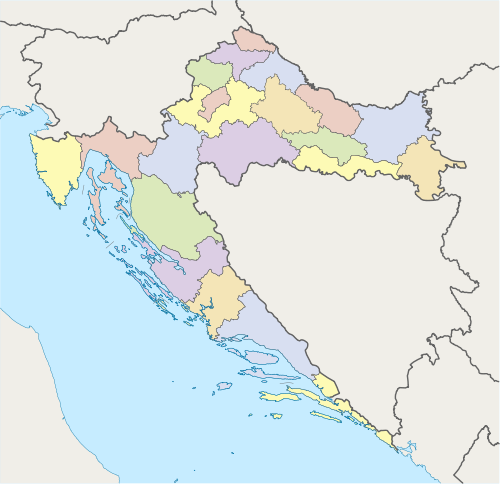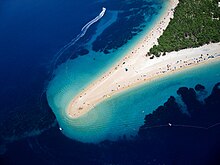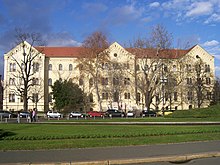- 6.1 Arts
- 6.2 Literature
- 6.3 Media
- 6.4 Cuisine
- 6.5 Sports
- 7 See also
- 8 References
- 9 External links
History
Prehistory and antiquity
The area known as Croatia today was inhabited throughout the prehistoric period. Fossils of Neanderthals dating to the middle Paleolithic period have been unearthed in the areas of Krapina and Vindija in northern Croatia. Remnants of the Starčevo, Vučedol and Hvar cultures, all dating from the early Neolithic period, were found in other parts of the country. The Iron Age left traces of the Hallstatt culture (early Illyrians) and the La Tène culture (Celts).
Much later the region was settled by Liburnians and Illyrians, and Greek colonies were established on the islands of Vis (by Dionysius I of Syracuse) and Hvar.[10] In 9 AD the territory of today's Croatia became part of the Roman Empire. Emperor Diocletian built a massive palace in Split where he retired from politics in AD 305.[11] During the 5th century the last Roman Emperor Julius Nepos[12] ruled his small empire from Diocletian's Palace before he was killed in AD 480.
Early history of Croatia ends with the Avar invasion in the first half of the 7th century and the destruction of almost all Roman towns. Roman survivors retreated to strategically better defended points on the coast, islands and mountains. The modern city of Dubrovnik was founded by those survivors.
Ethnogenesis of Croatian people (called White Croats before the migration) started with their emigration from the territory of White Croatia, located in central Europe, to the area of the present day Croatia and Bosnia and Herzegovina.
Medieval Croatia
According to the work De Administrando Imperio written by the 10th-century Byzantine Emperor Constantine VII Croats had arrived in what is today Croatia probably in the early 7th century.[13] They soon formed two dukedoms; the Duchy of Pannonia in the north and the Duchy of Littoral Croatia in the south. The Christianization of Croats first began in the 7th century when Pope John IV (640–642) sent Christian teachers and missionaries to Croatian Provinces,[14] and was mostly complete by the 9th century. In the late 8th century both duchies became Frankish vassals before regaining independence in the following century. The first native Croatian ruler recognized by the Pope was duke Branimir, whom Pope John VIII referred to as Dux Croatorum ("Duke of Croats") in 879.[15]
Duke Tomislav of Littoral Croatia was the most prominent member of the House of Trpimirović, a dynasty which ruled Croatia between the 9th and 11th century. Tomislav annexed parts of Pannonian Croatia and merged the two duchies into a single kingdom in 925, which is assumed to have been delimited by the Adriatic Sea, the Drava river, the Raša river and the Drina river. The medieval Croatian kingdom reached its peak in the 11th century during the reigns of Petar Krešimir IV (1058–1074) and Zvonimir (1075–1089). Following the extinction of the Croatian ruling dynasty in 1091, Ladislaus I of Hungary – brother of Helen II, the last Croatian queen – became king of Croatia. Croatian nobility of the Littoral opposed this crowning which led to a 10-year war and the subsequent recognition of the Hungarian ruler Coloman as king of Croatia and Hungary in the treaty of 1102 referred to as Pacta conventa. In return, Coloman promised to maintain Croatia as an autonomous kingdom headed by a viceroy, titled Ban.
For the next four centuries, the Kingdom of Croatia was ruled by Sabor (parliament) and Bans appointed by the Hungarian king. The Kingdom of Croatia and Slavonia remained a legally distinct constitutional entity,[16] but the advent of a Hungarian king brought about other consequences such as: the introduction of feudalism and the rise of native noble families such as the Frankopans and the Šubićs. The 1273 Congregatio Regni tocius Sclavonie Generalis, the oldest surviving document written by the Croatian parliament, dates from this period.[17] Subsequent kings sought to restore some of their previously lost influence by granting certain privileges to towns. The first period of personal union between Croatia and Hungary ended in 1526 with the Battle of Mohács and the defeat of Hungarian forces by the Ottomans. After the death of King Louis II, Croatian nobles at the Cetingrad assembly chose the Habsburgs as new rulers of the Kingdom of Croatia, under the condition that they provide the troops and finances required to protect Croatia against the Ottoman Empire.[17][18]
Dalmatian cities
While the Kingdom of Croatia controlled much of the hinterland of what was once the Roman province of Dalmatia, the fortified cities of Dalmatia, at the time the economic and cultural centres of the region, still with a substantial amount of Romance-speaking population, mostly remained under nominal Byzantine control, with the Kingdom of Croatia and the Republic of Venice vying for control over them. These included Zadar, Šibenik, Split and Dubrovnik (at the time known as Ragusa). Dubrovnik had originally been founded in the 7th century,[19] and evolved into an independent maritime republic. During the Fourth Crusade (1202–1204) the city fell under the control of Venice, which lasted until the 14th century and the 1358 Treaty of Zadar when Venetians' defeat at the hands of the Kingdom of Hungary caused them to lose control of Dalmatia.
By the 15th century Venice again brought much of Dalmatia under its control but the Republic of Ragusa, under protection of the Ottomans and Habsburgs, enjoyed independence and became rich through trade. At a time when inland Croatia was embroiled in a series of devastating wars against the Ottoman Empire, Dubrovnik flourished and became the most important centre for Croatian literature during the Renaissance and Baroque periods. In 1797 Napoleon's forces occupied the entire eastern Adriatic coastline as well as a substantial part of the hinterland, ending both the Venetian and the Ragusan republics and establishing the French-controlled Illyrian Provinces. Along with the large Slavic (Croatian) majority, Dalmatia retained large Italian communities along the coast. According to the 1816 Austro-Hungarian census, 22% of Dalmatian population was Italian-speaking.[20] Since the 19th century, most Dalmatian Italians and Morlachs (speakers of the Istro-Romanian language) were gradually assimilated by the prevailing Croatian culture and language.
Habsburg Monarchy and Austria-Hungary
In 1529 the Ottoman army captured Buda and besieged Vienna in an event which brought turmoil to Croatian border areas. After the failure of early military operations the Kingdom of Croatia was split into civilian and military units in 1553. The latter eventually became known as the Croatian Military Frontier, a territory directly controlled by Vienna. Ottoman raids on Croatian territory continued until the 1593 Battle of Sisak which resulted in Ottoman defeat and after which the borders stabilised for a time. During the Great Turkish War (1667–1698), Slavonia was regained but western Bosnia, which had been part of Croatia since before the Ottoman conquest, remained outside Croatian control. The present-day crescent-shaped border between the two countries is a historical remnant of this outcome. Dalmatia, the southern part of the crescent, was created by Venetian conquests which ensued following the 13th-century Siege of Zara and was eventually defined by the 17h- and 18th-century wars with Ottomans.
Over the course of the two centuries of Ottoman wars Croatia underwent great demographic changes. Croats who had inhabited the areas of Lika, Moslavina and north-west Bosnia migrated towards Austria and the present-day Burgenland Croats are direct descendants of these settlers. To replace the fleeing Croats the Habsburgs called on the Orthodox populations of Bosnia and Serbia to provide military service in the Croatian Military Frontier. Serb migration into this region, which had started in the 16th century, peaked during the Great Serb Migrations of 1690 and 1737–39.
Fuelled by the ideas of romantic nationalism which became popular throughout Europe in the 19th century, a national revival in Croatia, called the Illyrian movement, began gaining ground in the 1830s. The movement was a political and cultural campaign initiated by a group of Croatian intellectuals who advocated for unity of all South Slavs within the Habsburg Monarchy and their most important focus was the establishment of a standard language as a counter-weight to Hungarian and the promotion of Croatian literature and culture. Prominent members of this movement were writers Ivan Mažuranić and Petar Preradović, poet Antun Mihanović, composer Vatroslav Lisinski and Ljudevit Gaj who published the first standardized orthography of the Croatian language. Due to the popularity of the Illyrian movement Croatian became official language in the Kingdom of Croatia in 1847, replacing Latin.
During the Hungarian Revolution of 1848 Croatia sided with Austrian and Russian forces who defeated the Hungarian army in 1849, which ushered a period marked by a policy of Germanization. By the 1860s its failure became apparent, which resulted in the Austro-Hungarian Compromise of 1867 and the creation of a monarchic union between the crowns of the Austrian Empire and the Kingdom of Hungary. The treaty left the issue of Croatia's status unresolved. The kingdoms of Croatia and Slavonia were eventually united following the Croatian–Hungarian Settlement of 1868.[21] The sovereignty over the port city of Rijeka remained contested between Croatia and Hungary, while Kingdom of Dalmatia remained under Austrian control. After the Ottoman Empire had lost control over Bosnia and Herzegovina in the 1878 Treaty of Berlin, Austria-Hungary abolished the Croatian Military Frontier and restored the territories to Croatia in 1881. In the late 19th century pro-Hungarian and pro-Austrian political parties played Croats against Serbs with the aim of controlling the parliament.[citation needed] This policy failed in 1906 when the Croat-Serb Coalition won the elections. This political situation remained unchanged until the advent of World War I.
Kingdom of Yugoslavia and World War II
On 29 October 1918 the Croatian Sabor (parliament) declared independence and decided to join the newly formed State of Slovenes, Croats and Serbs,[22] which in turn entered into union with Kingdom of Serbia on 1 December 1918 to form the Kingdom of Serbs, Croats, and Slovenes. In 1921 the kingdom adopted a new constitution which envisioned the country as a unitary state governed under a constitutional monarchy and a parliamentary system. In 1922 historical provinces were abolished and the country was divided into 33 oblasts.
These decisions effectively put an end to state autonomy and were met with public outcry in Croatia. A movement for the restoration of state autonomy thus began gaining ground under the leadership of the Croatian Peasant Party (HSS). As the adoption of the 1921 constitution sparked tensions among ethnic groups,[23] the already unhealthy political situation became even worse after Stjepan Radić, the president of HSS, was assassinated during a Yugoslav Parliament session in June 1928 by a Serb ultranationalist deputy Puniša Račić. Following the political crisis triggered by the shooting, in January 1929 King Alexander abolished the constitution, dissolved the parliament, and declared a royal dictatorship, officially renamed Kingdom of Yugoslavia. In October oblasts were replaced by a system of nine banovinas, with most of Croatian territory split into the northern Sava Banovina (with seat in Zagreb) and Littoral Banovina (with seat in Split).
Vladko Maček, who had succeeded Radić at the helm of HSS and who continued to call for greater autonomy for Croatia, was imprisoned in 1933 and sentenced to three years in jail for treason. However, Maček was released following Alexander's assassination in Marseille in October 1934 which had been organized by foreign-based Macedonian and Croatian nationalist groups, the Internal Macedonian Revolutionary Organization (IMRO) and the Ustaše. Upon his release, Maček continued to be a vocal proponent of greater federalization of Yugoslavia, which eventually resulted in the Cvetković–Maček Agreement of August 1939 which created the autonomous Banovina of Croatia. Its borders were in part historical borders of Croatia, and in part based on the application of the principle of ethnicity according to which the territory in Bosnia and Herzegovina with a majority ethnic Croat population was annexed to the Banovina. The Banovina would be governed in internal matters by the Croatian Sabor (parliament) and a crown-appointed Ban.

Josip Broz Tito was the leader of the Yugoslav communist resistance (photo from 1971).
In April 1941 Kingdom of Yugoslavia was invaded and occupied by Germany and Italy in little more than ten days. Following the invasion the territory of Croatia, Bosnia and Herzegovina and the region of Syrmia were incorporated into Independent State of Croatia (NDH), a Nazi-backed puppet state.[24][25] Parts of Dalmatia were occupied by Italy and northern Croatian regions of Baranja and Međimurje were occupied by Hungary. The newly installed NDH regime was led by Ante Pavelić and members of his ultranationalist movement Ustaše. The Ustaše regime introduced anti-semitic laws and conducted a brutal campaign of ethnic cleansing against Serb and Roma inhabitants of NDH, exemplified by concentration camps such as the one at Jasenovac and Stara Gradiška where opponents of the Ustaše regime and other 'undesirables' were held.[26][27] The Jewish Virtual Library estimates that between 45,000 and 52,000 Croatian Serbs were killed at Jasenovac and that between 330,000 and 390,000 Serbs were victims of the entire genocide campaign.[28]
A resistance movement soon emerged and in June 1941 the 1st Sisak Partisan Detachment was formed near Sisak, as the first military unit formed by a resistance movement in occupied Europe.[29] This sparked the beginning of the Yugoslav Partisan movement, a communist multi-ethnic anti-fascist resistance group led by Josip Broz Tito. Initially fighting as a guerrilla force, the movement grew rapidly and by late 1944, the Partisans numbered 800,000 men and women organized in four field armies and 52 divisions which engaged in conventional warfare.[30] The Partisans' goal was to create a communist state in Yugoslavia and to this end they attempted to appeal to all the various ethnic groups within Yugoslavia by adopting a policy of brotherhood and unity. Following the Tehran Conference in December 1943 Partisans gained recognition from the Allies. With their support in logistics, equipment, training and air power, and with the assistance of Soviet troops in the November 1944 Belgrade Offensive, they eventually gained control of the entire country and the border regions of Italy and Austria by the end of WWII in May 1945. Post-war estimates have put the number of WWII casualties in present-day Croatia at around 270,000.
Modern era
Modern Croatia was founded on AVNOJ anti-fascist partisans' principles during World War II, and it became a constitutional federal republic of the Socialist Federal Republic of Yugoslavia.[31] A single-party socialist state was established but, because of the Tito-Stalin split, economic and personal freedom were better than in the Eastern Bloc. From the 1950s, the Socialist Republic of Croatia enjoyed an autonomy under the rule of the local Communist elite, but in 1967 a group of influential Croatian poets and linguists published a Declaration on the Status and Name of the Croatian Standard Language.
After 1968, the patriotic goals of that document morphed into a generic Croatian movement for more rights for Croatia, greater civil rights and demands for the decentralization of the economy. In the end the Yugoslav leadership interpreted the Croatian Spring as a restoration of Croatian nationalism, dismissed the movement as chauvinistic and arrested most of its important leaders. In 1974, a new Yugoslav federal constitution was ratified that gave more autonomy to the individual republics, thereby basically fulfilling the main goals of the Croatian Spring.
Nationalistic sentiment, which would bring an end to the Yugoslav federation, had been widespread among various ethnicities for some years. Albanian demands in 1981 for Kosovo to be removed from Serbia and transformed to a constituent republic within Yugoslavia led to riots,[32] and similar attitudes surfaced among other nations with the Serbian SANU Memorandum in 1986; Croatia and Slovenia also responded negatively in 1989 after Serbia's leader Slobodan Milošević organized coups in Vojvodina, Kosovo and Montenegro to install authorities who would be loyal to his cause.[33][34]
Croatia declared independence from socialist Yugoslavia in 1991.[35][36][37] War broke out in 1991 with Yugoslav National Army open attacks on Croatia.[38] At the end of 1991 there was full-scale war in Croatia.[39] The war was between the Serbs, in what had been the Republic of Serbia in the former Yugoslavia, and Croats in the newly independent Croatia. The reasons for the war are quite complex. To greatly simplify, while Croatia and Slovenia wanted to separate from Yugoslavia, Serbs were largely unwilling to allow this to happen, probably largely for economic reasons.[40]
Franjo Tuđman's election win further inflamed the situation. Croatian Serbs left the Croatian parliament and created the Association of the Municipalities of Northern Dalmatia and Lika in Knin.[41] This was later to become the Republika Srpska Krajina.[42] On the events of 1990–92, Milan Babić, Serbian leader and president of Republika Srpska Krajina, was later to declare that he had been "strongly influenced and misled by Serbian propaganda."[43]
These events culminated in the full scale Croatian War of Independence between 1991 and 1995. The war ended with Croatian victory with Operation Storm (known in Croatian as Oluja) in the summer of 1995.[44] The events of August 1995 remain the subject of several cases before the International Criminal Tribunal for the former Yugoslavia, regarding the conduct of the victorious Croatian Army and the exodus of ethnic Serbs.[45]
Croatia was internationally recognized on 15 January 1992 by the European Union,[46] and subsequently the United Nations.[47] During that time, Croatia controlled less than two thirds of its legal territory.
Geography

Topographic map of Croatia
Croatia is located in Southeast Europe bordering Bosnia and Herzegovina and Serbia in the east, Slovenia in the west, Hungary in the north and Montenegro in the south. It lies mostly between latitudes 42° and 47° N and longitudes 13° and 20° E. Part of the territory in the extreme south is separated from the rest of the mainland by a short coastline strip belonging to Bosnia and Herzegovina around Neum.
The territory covers 56,594 km2 (21,851 sq mi), consisting of 56,414 km2 (21,782 sq mi) of land and 128 km2 (49 sq mi) of water. It is the 27th largest European country and the 127th largest in the world.[48] Elevation ranges from the mountains of the Dinaric Alps (highest point: the Dinara peak at 1,831 metres / 6,007 feet) near the border with Bosnia and Herzegovina in the south to the shore of the Adriatic Sea which makes up its entire south-west border.[48]
The hilly northern parts of Hrvatsko Zagorje and the flat plains of Slavonia in the east (which is part of the Pannonian Basin) are traversed by major rivers such as Sava, Drava and Kupa and Danube. The Danube, Europe's second longest river, runs through the city of Vukovar in the extreme east and forms part of the border with Serbia. The central and southern regions near the Adriatic coastline and islands consist of low mountains and forested highlands. Significant natural resources include oil, coal, bauxite, low-grade iron ore, calcium, gypsum, natural asphalt, silica, mica, clays, salt and hydropower.[48]
Insular Croatia consists of over one thousand islands varying in size. The largest islands in Croatia are Cres and Krk.
Karst topography makes up more than 50% of Croatia[49] and is especially obvious in the area south of Karlovac.[50] There are 49 caves deeper than 250 m (820.21 ft) in Croatia, with 14 of them deeper than 500 m (1,640.42 ft) and three deeper than 1,000 m (3,280.84 ft) (the Lukina jama-Trojama, Slovacka jama and Velebita cave systems).
Croatia's most famous lakes are the Plitvice lakes, a system of 16 lakes with waterfalls connecting them over dolomite and limestone cascades. The lakes are renowned for their distinctive colours, ranging from azure to green, grey or blue.
Climate
Croatia has a mixture of climates. In the north and east it is continental, Mediterranean along the coast and a semi-highland and highland climate in the south-central region. Istra has a temperate climate, while the Palagruža archipelago is home to a subtropical climate.
Biodiversity
Phytogeographically, Croatia belongs to the Boreal Kingdom and is shared between the Central European and Illyrian provinces of the Circumboreal Region and the Adriatic province of the Mediterranean Region. According to the WWF, the territory of Croatia can be subdivided into three ecoregions: the Pannonian mixed forests, Dinaric Mountains mixed forests and Illyrian deciduous forests.
The country is famous for its many national parks. Besides national parks, Croatian laws provide special protection to ten more nature parks and two strict natural reserves. Around ten percent of total territory of Croatia enjoys special protection by law in the aforementioned forms.
Politics
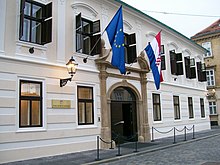
Banski dvori, a two-story baroque building which was the residence of Croatian
bans from 1809 until 1918 and is now the seat of government.
Croatia is a democratic parliamentary republic. With the collapse of the ruling communist party in Yugoslavia, Croatia adopted its present constitution in 1990 and organised its first multi-party elections. It declared independence on 8 October 1991 leading to the breakup of Yugoslavia and the country was internationally recognised by the United Nations in 1992. Under its 1990 constitution, Croatia operated a semi-presidential system until 2000 when it switched to a parliamentary system. The main institutions of government in Croatia are the President, Parliament and Government.
The President of the Republic (Predsjednik) is the head of state, directly elected to a five-year term and is limited by the Constitution to a maximum of two terms. In addition to being the commander in chief of the armed forces, the president has the procedural duty of appointing the Prime minister with the consent of the Parliament, and has some influence on foreign policy.
The Government of Croatia (Vlada) is headed by the Prime minister who has two deputy prime ministers and 14 ministers in charge of particular sectors of activity. The executive branch is responsible for proposing legislation and a budget, executing the laws, and guiding the foreign and internal policies of the republic. Government's official residence is at Banski dvori.
The Parliament of Croatia (Sabor) is a unicameral legislative body (a second chamber, the "House of Counties", which was set up by the Constitution of 1990, was abolished in 2001). The number of the Sabor's members can vary from 100 to 160; they are all elected by popular vote to serve four-year terms. The plenary sessions of the Sabor take place from January 15 to July 15, and from September 15 to December 15. The two largest political parties in Croatia are the Croatian Democratic Union and the Social Democratic Party of Croatia (the latter evolved from the League of Communists of Croatia).
Croatia has a three-tiered judicial system, consisting of the Supreme Court, County courts, and Municipal courts. The Constitutional Court rules on matters regarding the Constitution. Law enforcement in Croatia is the responsibility of the Croatian police force, which is under the control of the Ministry of the Interior.[51] In recent years, the force has been undergoing a reform with assistance from international agencies, including the Organization for Security and Co-operation in Europe since its mission to Croatia began on 18 April 1996.[51]
The legal system of Croatia is civil law, strongly influenced by the legal heritage of Austria-Hungary with an influx of communist law. The institutional framework was built on the base of Austrian institutions.[52] Nowadays, it is almost completely harmonised with that of the European Union.
Administrative division
Croatia was first subdivided into counties in Middle Ages.[53] The divisions changed over time to reflect losses of territory to Ottoman conquest and subsequent liberation of the same territory, changes of political status of Dalmatia, Dubrovnik and Istria. Traditional division of the country in to counties was abolished in 1920s, when Kingdom of Serbs, Croats and Slovenes and subsequent Kingdom of Yugoslavia introduced oblasts and banovinas respectively.[54] Communist ruled Croatia, as a constituent part of post-WWII Yugoslavia, abolished earlier divisions and introduced municipalities, subdividing Croatia into approximately one hundred municipalities. Counties were reintroduced in 1992 legislation, significantly altered in terms of territory relative to the pre-1920s subdivisions: In 1918, the Transleithanian part of Croatia was divided in eight counties with their seats in Bjelovar, Gospić, Ogulin, Požega, Vukovar, Varaždin, Osijek and Zagreb, and the 1992 legislation established 15 counties in the same territory.[55][56]
Since the counties were reestablished in 1992, Croatia is divided into 20 counties and the capital city of Zagreb, the latter having authority and legal status of a county and a city at the same time. Borders of the counties changed in some instances since, with the latest revision taking place in 2006. The counties subdivide into 127 cities and 429 municipalities.[57]
| County |
Seat |
Area (km²) |
Population |
| Bjelovar-Bilogora |
Bjelovar |
2,652 |
119,743 |
| Brod-Posavina |
Slavonski Brod |
2,043 |
158,559 |
| Dubrovnik-Neretva |
Dubrovnik |
1,783 |
122,783 |
| Istria |
Pazin |
2,820 |
208,440 |
| Karlovac |
Karlovac |
3,622 |
128,749 |
| Koprivnica-Križevci |
Koprivnica |
1,746 |
115,582 |
| Krapina-Zagorje |
Krapina |
1,224 |
133,064 |
| Lika-Senj |
Gospić |
5,350 |
51,022 |
| Međimurje |
Čakovec |
730 |
114,414 |
| Osijek-Baranja |
Osijek |
4,152 |
304,899 |
| Požega-Slavonia |
Požega |
1,845 |
78,031 |
| Primorje-Gorski Kotar |
Rijeka |
3,582 |
296,123 |
| Šibenik-Knin |
Šibenik |
2,939 |
109,320 |
| Sisak-Moslavina |
Sisak |
4,463 |
172,977 |
| Split-Dalmatia |
Split |
4,534 |
455,242 |
| Varaždin |
Varaždin |
1,261 |
176,046 |
| Virovitica-Podravina |
Virovitica |
2,068 |
84,586 |
| Vukovar-Syrmia |
Vukovar |
2,448 |
180,117 |
| Zadar |
Zadar |
3,642 |
170,398 |
| Zagreb County |
Zagreb |
3,078 |
317,642 |
| City of Zagreb |
Zagreb |
641 |
792,875 |
Foreign relations
Croatia has established diplomatic relations with 174 countries.[58] As of 2009, Croatia maintains a network of 51 embassies, 24 consulates and eight permanent diplomatic missions abroad. Furthermore, there are 52 foreign embassies and 69 consulates in the Republic of Croatia in addition to offices of international organizations such as the European Bank for Reconstruction and Development, International Organization for Migration, Organization for Security and Co-operation in Europe (OSCE), World Bank, World Health Organization, International Criminal Tribunal for the former Yugoslavia (ICTY), United Nations Development Programme, United Nations High Commissioner for Refugees and UNICEF.[59] In 2009, Croatian Ministry of Foreign Affairs and European Integration employed 1,381 personnel and expended 648.2 million kuna (86.4 million euro).[60] Stated aims of Croatian foreign policy include enhancing relations with neighboring countres, developing international cooperation and promotion of Croatian economy and Croatia itself.[61]
Since 2003, Croatian foreign policy focuses on achieving a strategic goal of becoming a member of the European Union (EU).[62][63] As of September 2011, Croatia has completed EU accession negotiations and is expected to sign an EU accession treaty by the end of 2011.[64][65] Croatian EU membership is scheduled as of July 1, 2013, representing the end of a process started in 2001 by signing of the Stabilisation and Association Agreement and Croatian application for the EU membership in 2003.[66] A recurring obstacle to the negotiations was Croatia's ICTY cooperation record and Slovenian blockade of the negotiations because of Croatia–Slovenia border disputes. The latter was resolved through an Arbitration Agreement of November 4, 2009, approved by national parliaments and a referndum in Slovenia.[67] The other strategic Croatian foreign policy goal of the 2000s besides the EU was NATO membership.[62][63] Croatia was included in the Partnership for Peace in 2000, invited to NATO membership in 2008 and it formally joined the alliance on April 1, 2009.[68][69] Croatia became a member of the United Nations Security Council for the 2008–2009 term, assuming presidency in December 2008.[70]
In contrast, Croatian foreign policy of the 1990s was initially focused on securing international recognition of Croatia. Besides a mutual recognition agreement between Croatia and Slovenia, the first diplomatic recognitions were received from Iceland and Germany on December 19, 1991.[71][72] They were soon followed by the rest of the EU member states, China, Russia and the United States.[73] Croatia became a member of the United Nations (UN) on May 22, 1992.[74] Badinter Arbitration Committee was instrumental for the recognition, as opinions of the committee defined criteria for the diplomatic recognition and confirmed borders of Croatia.[75]
During the Croatian War of Independence, the UN, the European Economic Community (EEC) and the OSCE set up and implemented a number of monitoring or peacekeeping missions in Croatia. Those include the United Nations Protection Force (UNPROFOR), succeeded by the United Nations Confidence Restoration Operation (UNCRO), in turn replaced by the United Nations Mission of Observers in Prevlaka (UNMOP) and the United Nations Transitional Authority for Eastern Slavonia, Baranja and Western Sirmium (UNTAES).[76][77][78][79] The EEC's European Community Monitor Mission (ECMM) and the OSCE monitoring missions were considerably less prominent than the UN missions which were present in Croatia since February 1992 until January 1998 (UNTAES) and December 2002 (UNMOP).[80] In the early stages of the war, Croatia was especially supported by Germany and Austria, and in its later stages, it received a greater degree of support from the United States as well.[81]
The UNMOP left the Prevlaka area only after Croatia and Montenegro signed an agreement to refer their border dispute in the area to the International Court of Justice (ICJ).[82] Besides the border disputes with Montenegro and Slovenia, there are disputed areas of the border with Serbia along the Danube and disputed maritime border with Bosnia and Herzegovina near Neum.[83] Since Croatian territory is not contiguous, the Dubrovnik exclave access through Neum municipality is regulated by the Neum Agreement with Bosnia and Herzegovina, permitting unimpeded road traffic between Ploče and Dubrovnik.[84][85] Regardless of the disputes, leaders of Croatia and all the neighboring countries describe relations between the countries as good in all areas supportive of each other.[82][86][87]
Military
Croatian Armed Forces (CAF) consist of the Army, Navy and Air Force branches in addition to the Education and Training Command and Support Command. The CAF is headed by the General Staff which reports to the Defence Minister, who in turn reports to the President of Croatia. According to the constitution, the President is commander-in-chief of the armed forces and in case of immediate threat during wartime he issues orders directly to the General Staff.[88]
Following the 1991–95 war defence spending and CAF size are in constant decline. As of 2005 military spending was an estimated 2.39% of the country's GDP, which placed Croatia 64th in a ranking of all countries.[48] Since 2005 the budget was kept below 2% of GDP, down from the record high of 11.1% in 1994.[89] Traditionally relying on a large number of conscripts, CAF also went through a period of reforms focused on downsizing, restructuring and professionalisation in the years prior to Croatia's accession to NATO in April 2009. According to a presidential decree issued in 2006 the CAF is set to employ 18,100 active duty military personnel, 3,000 civilians and 2,000 18–30 year-old voluntary conscripts in peacetime.[88]
Compulsory conscription was abolished in January 2008.[48] Until 2008 military service was compulsory for men at age 18 and conscripts served six-month tours of duty, reduced in 2001 from the earlier scheme of nine-month conscription tours.[90] Conscientious objectors could instead opt for an eight-month civilian service.[90]
As of April 2011[update] the Croatian military had 120 members stationed in foreign countries as part of United Nations-led international peacekeeping forces, including 95 serving as part of UNDOF in Golan Heights.[91] As of 2011 an additional 350 troops serve as part of NATO-led ISAF force in Afghanistan and another 20 with KFOR in Kosovo.[92][93]
Croatia also has a significant military industry sector which exported around US$120 million worth of military equipment and armament in 2010.[94] Croatian-made weapons and vehicles used by CAF include the standard sidearm HS2000 manufactured by HS Produkt and the M-84D battle tank designed by the Đuro Đaković factory. Uniforms and helmets worn by CAF soldiers are also locally produced and successfully marketed to other countries.[94]
Economy
Privatization and the drive toward a market economy had barely begun under the new Croatian Government when war broke out in 1991. As a result of the war, the economic infrastructure sustained massive damage, particularly the revenue-rich tourism industry.[95] From 1989 to 1993, GDP fell 40.5%.[95] With the end of the war in 1995, tourism and Croatia's economy recovered moderately.[95] However, corruption, cronyism, and a general lack of transparency stymied meaningful economic reform, as well as much-needed foreign investment.[95]
Croatia's economy turned the corner in 2000 as tourism rebounded.[95] The economy expanded in 2002, stimulated by a credit boom led by newly privatized and foreign-capitalized banks, some capital investment, most importantly road construction, further growth in tourism, and gains by small and medium-sized private enterprises.[95]
Croatia has a high-income market economy.[96] International Monetary Fund data shows that Croatian nominal GDP stood at $69.357 billion, or $15,633 per capita,[3] at the same time in 2008 purchasing power parity GDP was $82.407 billion or $18,575 per capita.[3]
According to Eurostat data, Croatian PPS GDP per capita stood at 63.2 percent of the EU average in 2008.[97] Real GDP growth in 2007 was 6.0 per cent.[98] and at the same time average gross salary of a Croatian worker during the first nine months of 2008 was 7,161 kuna (US$ 1,530) per month[99] In 2007, the International Labour Organization-defined unemployment rate stood at 9.1 per cent, after falling steadily from 14.7 percent in 2002.[100] The registered unemployment rate is higher, though, standing at 13.7 percent in December 2008.[101]
In 2009, economic output was dominated by the service sector which accounted for 73,6% percent of GDP, followed by the industrial sector with 20,5% and agriculture accounting for 5,9% of GDP.[102] According to 2004 data, 2.7% of the workforce were employed in agriculture, 32.8% by industry and 64.5 in services.[1][103]
The industrial sector is dominated by shipbuilding, food processing, pharmaceuticals, information technology, biochemical and timber industry. Tourism is a notable source of income during the summers, with over 11 million foreign tourists in 2008 generating a revenue of €8 billion.[104] Croatia is ranked as the 18th most popular tourist destination in the world.[104] In 2008, Croatia exported goods to the value of $14.4 billion (FOB) ($26.4 billion including service exports).[104]
The Croatian state still controls a significant part of the economy, with government expenditure accounting for as much as 40% of GDP.[95] Some large, state-owned industries, such as the country's shipyards, continue to rely on government subsidies but with EU membership looming, Croatia is forced to restructure debt ridden shipyards as it is a prerequisites for Croatia before it joins the EU. Subsidies for loss making industries also reduce needed investments in to education and technology needed to ensure the economy's long-term competitiveness.[95]
Of particular concern is the backlogged judiciary system, combined with inefficient public administration, especially issues of land ownership and corruption. Another main problem includes the large and growing national debt which has reached over 34 billion euro or 89.1% of the nations gross domestic product.[105] Because of these problems, studies show that the population of Croatia generally has negative expectations of the country's economic future.[106]
Croatia has so far weathered the global financial crisis reasonably well, but faces significant challenges in 2010 largely due to Croatia's external imbalances and high foreign debt, which in longer term presents problems for Croatian financial sector due to higher cost of borrowing to cover current account deficit.[95]
The country has been preparing for membership in the European Union, its most important trading partner. In February 2005, the Stabilisation and Association Agreement with the EU officially came into force and by the end of 2009 Croatia has closed 17 EU accessions chapters, with remaining 16 to be completed by the end of first half of 2010. Croatia is expected to join the EU on 1 July 2013.[107]
List of the largest companies by turnover in 2010, according to Deloitte CE Top 500 Ranking report.[108][109]
Transport

A regional train and tilting train of the Croatian Railways.
The highlight of Croatia's recent infrastructure developments is its rapidly developed motorway network. Largely built in late 1990s and especially in 2000s. By September 2011, Croatia has completed more than 1,100 kilometres (680 miles) of motorways, connecting Zagreb to most other regions and following various European routes and four Pan-European corridors.[110][111][112] The busiest motorways are the A1, connecting Zagreb to Split and the A3, passing east–west through northwest Croatia and Slavonia.[113] A widespread network of state roads in Croatia acts as motorway feeder roads while connecting all major settlements in the country. High quality and safety levels of the Croatian motorway network was tested and confirmed by several EuroTAP and EuroTest programs.[114][115]
Croatia has an extensive rail network, although links to some regions are comparably poor: rail link to Istria passes through neighboring Slovenia, while Dubrovnik has no rail service. Serious investment is needed in the rail network over the coming decades to bring it up to European standards in both speed and operational efficiency. All rail services are operated by Croatian Railways.[116][117]
There are international airports in Zagreb, Zadar, Split, Dubrovnik, Rijeka, Osijek and Pula. As of January 2011, Croatia complies with International Civil Aviation Organization (ICAO) aviation safety standards and the Federal Aviation Administration upgraded it to Category 1 rating.[118]
The busiest cargo seaport in Croatia is the Port of Rijeka and the busiest passenger ports are found in Split and Zadar.[119][120] In addition to those there is a large number of minor ports serving an extensive system of ferries connecting numerous islands and coastal cities in addition to ferry lines to several cities in Italy.[121] The largest river port is Vukovar, located on the Danube, representing the nation's outlet to the Pan-European transport corridor VII.[110][122]
Demographics
Croatia's 2001 census recorded a total population of 4,437,460.[123] The first results of the 2011 census show that the total population is 4,290,612.[124]
Croatia is inhabited mostly by Croats (89.6%), while minority groups include Serbs (4.5%), Bosniaks, Hungarians, Italians, Slovenes, Germans, Czechs, Romani people and others (5.9%).[1] For most of the 20th century, the population of Croatia has been rising from 3,430,270 in 1931 to 4,784,265 in 1991.[125] The natural growth rate of the population is currently negative[1] with the demographic transition completed in the 1970s.[126]
Average life expectancy is 75.1 years,[1] and the literacy rate is 98.1 percent.[1] During recent years, the Croatian government is pressured each year to add 40% to work permit quotas for foreign workers[127] and in accordance with its immigration policy it is trying to entice emigrants to return.[128] The main religions of Croatia are Roman Catholic 88%, Orthodox 4.4%, other Christian 0.4%, Muslim 1.3%, other and unspecified 0.9%, none 5.2%.[129]
During the last decade of the 20th century the population of Croatia has been stagnating because of the Croatian War of Independence. During the war, large sections of the population were displaced and emigration increased. In 1991, in predominantly Serb areas, more than 400 000 Croats and other non-Serbs were either removed out of their homes by the Croatian Serb forces or fled the violence.[130] During the final days of the war in 1995, more than 120,000 Serbs,[131] and perhaps as many as 200,000[132] fled before the victory by Croatian forces.
Only a small fraction of Serbs have returned to their homes since 1995, according to Human Rights Watch.[133] Most of Croatia's remaining Serbs do not live in the highlands and inland of Dalmatia but rather in the Croatian heartland and major cities. Serbs have been only partially re-settled by the Croatian Government in the regions they previously inhabited (i.e., the blue areas of the map here). Many of the towns previously settled by Serbs were settled by Croat refugees from Bosnia and Herzegovina, mostly from Republika Srpska.
view · talk · edit view · talk · edit Largest cities of Croatia
2011 census |

Zagreb
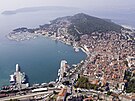
Split
|
| Rank |
City Name |
Counties of Croatia |
Pop. |
Rank |
City Name |
Counties of Croatia |
Pop. |
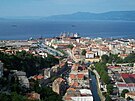
Rijeka

Osijek
|
| 1 |
Zagreb |
City of Zagreb |
792,875 |
11 |
Varaždin |
Varaždin |
47,055 |
| 2 |
Split |
Split-Dalmatia |
178,192 |
12 |
Šibenik |
Šibenik-Knin |
46,372 |
| 3 |
Rijeka |
Primorje-Gorski Kotar |
128,735 |
13 |
Dubrovnik |
Dubrovnik-Neretva |
42,641 |
| 4 |
Osijek |
Osijek-Baranja |
107,784 |
14 |
Bjelovar |
Bjelovar-Bilogora |
40,443 |
| 5 |
Zadar |
Zadar |
75,082 |
15 |
Kaštela |
Split-Dalmatia |
38,474 |
| 6 |
Velika Gorica |
Zagreb |
63,511 |
16 |
Samobor |
Zagreb |
37,607 |
| 7 |
Slavonski Brod |
Brod-Posavina |
59,507 |
17 |
Vinkovci |
Vukovar-Syrmia |
35,375 |
| 8 |
Pula |
Istria |
57,765 |
18 |
Koprivnica |
Koprivnica-Križevci |
30,872 |
| 9 |
Karlovac |
Karlovac |
55,981 |
19 |
Vukovar |
Vukovar-Syrmia |
28,016 |
| 10 |
Sisak |
Sisak-Moslavina |
47,699 |
20 |
Đakovo |
Osijek-Baranja |
27,798 |
Education
Primary education in Croatia starts at the age of six or seven and consists of eight grades. In 2007 a law was passed to increase free but not compulsory education until 18 years of age. Compulsory education consists of eight grades (Elementary School) Secondary education is provided by gymnasiums and vocational schools.
Croatia has eight universities, the University of Zagreb, University of Split, University of Rijeka, University of Osijek, University of Zadar, University of Dubrovnik the University of Pula and Dubrovnik International University. The University of Zadar, the first University in Croatia, was founded in 1396 and remained active until 1807, when other institutions of higher education took over until the foundation of the renewed University of Zadar in 2002. The University of Zagreb, founded in 1669, is the oldest continuously operating University in Southeastern Europe. There are also 11 polytechnics and 23 higher education institutions of which 19 are private.
There are numerous public music schools on the primary and secondary education levels. Over thirty scientific institutes are registered in Croatia, the largest one being the Institute "Ruđer Bošković" in Zagreb that excels in physics. The Croatian Academy of Sciences and Arts in Zagreb is a learned society promoting language, culture, arts and science from its first conception in 1836.
According to a survey ordered by the European commission in 2005, 49% of Croats speak English, 34% speak German, 14% Italian, 4% French and Russian and 2% Spanish language.[134]
A worldwide study about the quality of education in different countries published by Newsweek in August 2010 ranked Croatian education system on the 22nd place, to share the position with Austria.[135]
Culture
Arts
Croatian culture is the result of a fourteen century-long history which has seen the development of many cities and monuments and also includes many adoptions from ancient Greek, Roman and Illyrian cultures. The culture of Croatia can be divided into two cultural circles: Central European and Mediterranean. The country includes seven World Heritage sites and eight national parks. Croatia is also the birthplace of a number of historical figures. Included among the notable people are three Nobel prize winners and numerous inventors. The country is also rich with Intangible culture and holds the largest number of UNESCO's World's intangible culture masterpieces in Europe.
Regional cultures are considered variations on the larger category of "Croatian", including the cultures of Dalmatia, Istria, Slavonia, and Zagorje. These regions are characterized by differences in geography, traditional economy, food, folkloric tradition, and dialect. Despite that, Croats share an overall sense of national culture but at the same time often feel strong about regional identities and about local cultural variations. Cultural variations, particularly regional cuisine, are related to geographic variations within the country. Traditional economies are also linked to geography. The capital, Zagreb, is centrally located but was not chosen for that reason. It is the largest city, but also historically the political, commercial, and intellectual center.
Architecture in Croatia reflects the influence of the bordering nations. Austrian and Hungarian influences are visible in public space and buildings in the north and central regions. Large squares named for culture heroes, well-groomed parks, and pedestrian-only zones, are features of these orderly towns and cities. Muted colors prevail, especially tones of yellow and gold. In urban areas, houses are built right up to the street. An inner courtyard sometimes provides space for a small garden. Modern houses in cities and villages usually have two or three stories with masonry and stucco.
Along the coast, the architecture is Mediterranean. Houses are usually made of stucco and painted white, and have red tile roofs. Cities and towns still have the characteristic open markets, squares, and Catholic churches, but are less likely to be laid out in a neat grid. Generally speaking, continental architecture is of baroque architecture gauge and coastal areas are examples of renaissance architecture.
Literature
Croatians are protective of the their Croatian language from foreign influences as the language was under constant change and threats imposed by previous rulers (i.e. Austrian German, Hungarian, Italian and Turkish words were changed and altered to "Slavic" looking/sounding ones).
The Croatian language has three major dialects, identified by three different words for "what" ća, kaj and što. From 1961 to 1991, the official language was Serbo-Croatian. Even under socialism, Croats often referred to their language as Croato-Serbian (instead of Serbo-Croatian) or as Croatian. Croatian and Serbian variants of the language were never recognized as different, but referred as the west and east version, and had different alphabets; Latin alphabet and Serbian Cyrillic.
In the late 19th and 20th century, Serbian and Yugoslav nationalist scholars began to impose policies to change or alter Croatian words into "Serbian" or "South Slavic" ones, which have infuriated Croats over the purity and preservation of their native language (See Croatian linguistic purism). Under the Habsburgs, Latin was the official language of the Croatian government and Sabor. At the same time, besides Croatian, many Croats used German and Italian in everyday life. A national reawakening in the 19th century focused on the establishment of a national language as the official one.
Media
The freedom of the press and the freedom of speech are guaranteed by the constitution of Croatia.[136] Croatia ranked 62nd in the 2010 Press Freedom Index report compiled by Reporters Without Borders.[137]
The state-owned news agency HINA runs a wire service in Croatian and English on politics, economics, society and culture. In broadcasting, the government-funded corporation Croatian Radiotelevision (HRT) runs two free-to-air terrestrial and one satellite TV channel. HRT also broadcasts three nationally aired and eight regional radio stations. HRT had a monopoly on nationally-aired broadcasting until the late 1990s when the media was liberalised and a system of renewable broadcast licenses at the national and county levels was adopted. Nationally Croatia is served by two other privately-owned networks Nova TV and RTL, both of which are foreign-owned.
In print media the market is dominated by the Croatian Europapress Holding and Austrian Styria Media Group companies which publish their flagship dailies Jutarnji list, Večernji list and 24sata. Other influential newspapers are Novi list, Slobodna Dalmacija and the state-owned Vjesnik. There is also a number of local newspapers and current affairs weeklies. The book publishing market is dominated by several major publishing houses such as Školska knjiga, Profil, VBZ, Algoritam and Mozaik and the industry's centrepiece event is the Interliber trade fair held annually in Zagreb and open to public. In recent years, cable television and IPTV networks are gaining ground in large cities, allowing most Croatians to access programs from neighbouring countries.
Croatia's film industry is small and heavily assisted by the government, mainly through grants approved by the Ministry of Culture with films often being co-produced by HRT. The ministry also sponsors the Pula Film Festival, the national film awards event held annually in Pula, as well as a variety of specialised international film festivals such as Animafest and ZagrebDox, which often feature programs showcasing works by local filmmakers.
Cuisine
Due to historical influences Croatian traditional cuisine varies from region to region. The coastal regions of Dalmatia and Istria share a culinary culture with other Mediterranean cuisines which prominently features various seafoods, cooked vegetables and pasta, as well as condiments such as olive oil and garlic. Well-known dishes from these areas include maneštra (vegetable stew), pašticada (cooked marinated beef), brudet (fish stew), rožata (custard pudding) and fritule (sweet fried pastry). Northern and eastern parts of the country foster a cuisine dominated by Central European influences and is closely related to Austrian and Hungarian cuisines. Commonly found dishes in these regions include štrukli (cheese puff pastry), Wiener Schnitzel (type of fried steak), palačinke (variety of pancake), fiš paprikaš (river fish stew) and gulaš (meat stew). Some dishes of Turkish origin which influenced Balkan cuisine like burek, ćevapi or sarma are also very popular round the country.
There are two distinct wine-producing regions in Croatia. The continental region in the north-east of the country produces rich fruity white wines. Along the north coast, Istrian wines are similar to those produced in neighbouring Italy, while further south Mediterranean-style red wines are the norm. Although beer arrived to the country relatively late in the 18th century,[138] the annual consumption per capita was 83.3 litres in 2008 which placed Croatia 15th among world's countries.[139]
Sports
The most popular sports in Croatia are football, handball, basketball, water polo, tennis, and skiing.
The Croatian national football team won a bronze medal in the 1998 FIFA World Cup and Davor Šuker won the Golden Boot as the top goal scorer. The national football team has also played in the quarter-finals of the 1996 European Championships and the 2008 European Championships. The team is currently ranked 9th in the FIFA World Rankings (as of July 2011). The most popular football players are Luka Modrić, Darijo Srna, Ivica Olić, Ivan Klasnić and Niko Kranjčar.
The Croatia national handball team is a two-time Olympic Champion (1996 and 2004). The team also won a gold medal at the 2003 World Men's Handball Championship, and silver medals in the 1995, 2003 and 2009 World Championships. Croatia won bronze medal in 1994 European Championships and silver in 2008. RK Zagreb was a 1992 and 1993 European champion and 4 times a runner-up (1995, 1997, 1998 and 1999). Croatian players Ivano Balić, Igor Vori and Domagoj Duvnjak are currently among the best handball players in the world.
The Croatian national basketball team won a silver medal at the 1992 Olympic basketball tournament, bronze medal at the 1994 FIBA World Championship and bronze medals at EuroBasket 1993 and EuroBasket 1995. Croatian basketball clubs were Euroleague champions 5 times: KK Split three times (in 1989, 1990 and 1991) and KK Cibona in 1985 and 1986. Croatian basketball players such as Dražen Petrović, Krešimir Ćosić and Toni Kukoč were amongst the first foreign players to succeed in the NBA in the United States.
The Croatia national water polo team won a gold medal at the 2007 FINA World Championships and bronze medals in 2009 and 2011. The team also won a silver medal at the 1996 Olympic water polo tournament and gold medal at the 2010 European Championship as well as silver medals in the 1999 and 2003 European Championships. Croatian water polo clubs were 13 times LEN Euroleague champions. HAVK Mladost from Zagreb was a seven time European Champion (in 1968, 1969, 1970, 1972, 1990, 1991 and 1996) and was awarded the title Best Club of the 20th Century by the LEN. VK Jug from Dubrovnik and VK Jadran from Split were both three time European champions.
The Croatian Davis Cup team (Ivan Ljubičić, Mario Ančić and Ivo Karlović with coach Nikola Pilić) won the 2005 Davis Cup tournament and reached semifinals in 2009 tournament (Marin Čilić and Ivo Karlović with coach Goran Prpić). Goran Ivanišević is one of the country's most popular sportsmen. Ivanišević won the 2001 Wimbledon Men's singles title and reached number 2 spot in ATP Rankings in July 1994. Ivan Ljubičić reached number 3 spot in ATP Rankings in May 2006. Iva Majoli won the 1997 Roland Garros Women's Singles title. Currently the best Croatian tennis player is Marin Čilić ranked 14th as of November 16, 2009.
Janica Kostelić is the most successful female alpine ski racer in the history of the Winter Olympic Games. She is the only woman to win four gold medals in alpine skiing at the Winter Olympics Alpine skiing events (in 2002 and 2006), and the only woman to win three alpine skiing gold medals in one Olympics (2002). She also won two slilver medals in 2006. Janica was the World Cup overall champion in 2001, 2003, and 2006. On February 5, 2006 Janica became only the second female skier to win all five disciplines in one season. She also holds the record for the highest number of points in one World Cup season. In 2006 she won Laureus World Sports Award for Sportswoman of the Year. Her elder brother Ivica Kostelić was the 2003 World Champion in slalom and the Men's Overall Champion at the 2011 Alpine Skiing World Cup, and is a three-time Winter Olympic silver medalist himself.
Blanka Vlašić is the best-known Croatian track and field athlete; she specialises in the high jump. She is 2007 and 2009 World Champion. Blanka is also 2008 World Indoor Champion and 2008 Olympic silver medalist. Her personal best is 2.08 m (6 ft 9.89 in) (which is only 1 cm less than the world record) set in Zagreb at August 31, 2009.
Croatia women's national volleyball team won silver medals three times at European Volleyball Championship in 1995, 1997 and 1999.



















 Croatia
Croatia![]() i/kroʊˈeɪʃə/ kroh-ay-shə; Croatian: Hrvatska pronounced [xř̩ʋaːtskaː]), officially the Republic of Croatia (Croatian: Republika Hrvatska
i/kroʊˈeɪʃə/ kroh-ay-shə; Croatian: Hrvatska pronounced [xř̩ʋaːtskaː]), officially the Republic of Croatia (Croatian: Republika Hrvatska ![]() listen (help·info)), is a country in Central Europe[6] and Southeastern Europe[1][7] at the crossroads of the Pannonian Plain, the Balkans, and the Adriatic Sea. Its capital and largest city is Zagreb. Croatia borders Slovenia to the northwest, Hungary to the northeast, Serbia to the east, Bosnia and Herzegovina to the southeast, and has a comparatively small stretch of border with Montenegro at its southernmost tip along the Adriatic coast.
listen (help·info)), is a country in Central Europe[6] and Southeastern Europe[1][7] at the crossroads of the Pannonian Plain, the Balkans, and the Adriatic Sea. Its capital and largest city is Zagreb. Croatia borders Slovenia to the northwest, Hungary to the northeast, Serbia to the east, Bosnia and Herzegovina to the southeast, and has a comparatively small stretch of border with Montenegro at its southernmost tip along the Adriatic coast.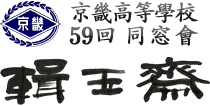





![Location of Croatia (green)in Europe (dark grey) — [Legend]](http://upload.wikimedia.org/wikipedia/commons/thumb/9/92/Europe-Croatia.svg/250px-Europe-Croatia.svg.png)
